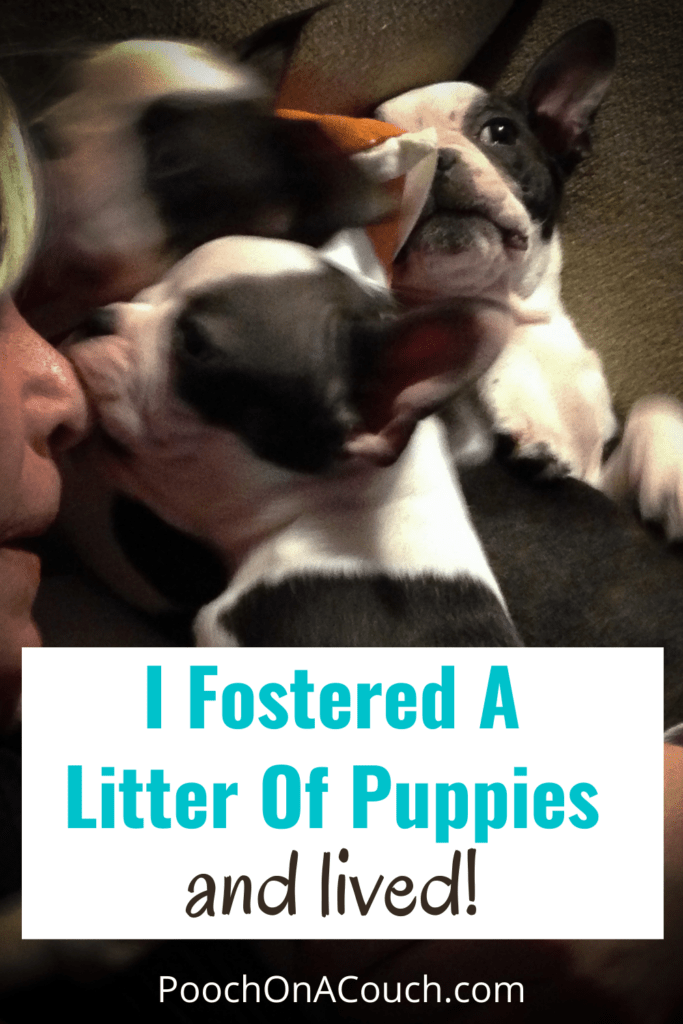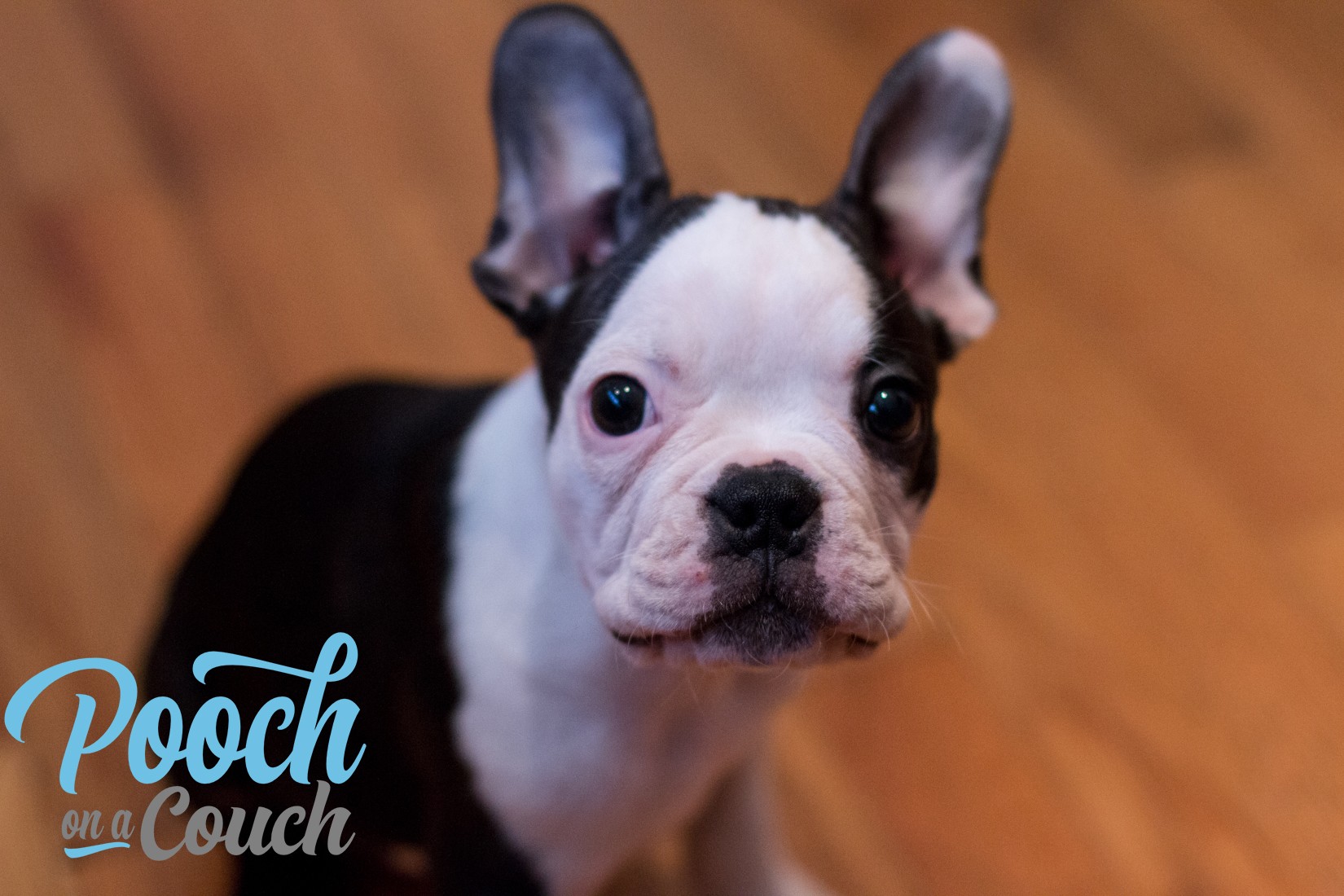I fostered a litter of puppies. Worst week of my life.
In some of my posts, you may have read about “the litter from hell” although I don’t think I’ve ever written their story. I learned a whole lot about puppies during the days I had these 5 little hellions – I mean lovelies!
A Litter Of Puppies Born At Christmas
Bright-eyed, excited to help, and presented with an opportunity to rescue Boston terriers in her catchment area (an area of the state TEAMING with many Boston terrier breeders) we gave this new volunteer authorization to go get a female Boston terrier out of the freezing cold. A breeder decided to cease operations and wanted her dogs G.O.N.E. By any means possible.
This pregnant female was the last of the dogs to leave for rescue.
6 beautiful Boston puppies were born in December and all given names befitting the season: Hope, Joy, Barbie, Nicholas, (Nick) Gus, and Ralph. Hope was the tiniest, and she faded away in her sleep a couple of days after her birth.
Little puppies become big puppies with big needs
At that time, we were not using any type of puppy rearing protocol like Puppy Culture, but our foster mom expressed confidence in her abilities and she certainly had the perfect space for mama dog: a quiet, unfurnished bedroom upstairs away from everything and everyone.
(I’d learn later why “away from everything and everyone” isn’t a good plan.)
The reports from the foster that came in were encouraging: It was a good mama dog taking really good care of her puppies, and the puppies were healthy and growing.
They received their vet check-ups, de-worming, and puppy vaccines right on schedule.
The foster was spending time with the litter every day, handling them and playing with them and keeping the floor cleaned and covered in fresh newspaper.
The weeks passed and the puppies were approaching 9 weeks of age. I began to advocate pretty heavily that it was time to divide the pups up into smaller groups of 2 and 3 and place at least one group in a new foster home.
For many reasons, that didn’t happen.
With puppies now nearly 12 weeks old, I’ve decided the puppies cannot delay any longer, and I announced I was going after them, would foster the whole litter, and the team could “figure it out from there.”
In the future, someone should impose a 48-hour wait period on me before I go off in knee-jerk fashion after a litter of puppies that are quite safe where they are. Half kidding – read on and I’ll tell you why.
Preparing To Foster A Litter Of Puppies
I emptied my dining room (not hard, I’d recently sold my table) and prepped it for 5 puppies who’ve yet to work on house-training. No biggie!
With guidance from my quarantine protocol, I laid down a layer of Visquine on top of a brand new blue tarp in an effort to protect my hardwood floors. I like using Visquine because it’s smooth (tarps are textured) and it’s easy to mop.
I like two waterproof layers because, well, pee.
On top of the floor protection, I set up a large x-pen and arranged bedding, bowls, toys, and pee pads. I also brought out 5 crates because I knew the puppies needed to gently begin learning how to spend time by themselves.
I went to the pet store and stocked up on food and other supplies.
It was a perfect set-up, I thought. I sorta have an open floorplan: there’s a half-wall dividing the main living space and the dining room so the puppies were protected by this wall and a baby gate and I could easily see and hear them and them see/hear me.
My Foster Litter Of Puppies Arrive.
They arrived. Fat and happy puppies. Beautiful puppies.
But they were LOUD like screaming banshees!
OMG, OMG, OMG.
I’ve agreed to foster a litter of puppies from hell.
They screamed at everything that moved and every sound they heard.
I opened the refrigerator and they’d scream.
I coughed and they’d scream.
Every time I walked by the dining room, they’d scream.
At two a.m., if one of the other puppies whimpered, the rest of the litter erupted in ear-piercing screams.
They screamed if the furnace kicked on.
That first day and night were awful, and I wracked my brain trying to figure out what I was doing wrong. I asked the foster for some insight. Surely she hadn’t lived with this noise for weeks and weeks?
Every Litter Of Puppies Has A Ringleader
Barbie was the loudest: She had a shrill to her voice that included 5 octaves. I wanted to rename her Myriah. She also screamed first and got everyone else riled up.

Nick was the most demanding. Not only would he scream, but he would also hurl his entire body into the side of the x-pen to get to the front of the pack, and continue to do. “Pick me! Pick me!” he’d screech as he body slammed himself into the wire wall, adding to the noise. He had a desperation, almost a panic to his behavior. I was kinda worried about him.

Joy would correct everyone. While screaming herself. The rest hoped to be second or third in line.
Big Tip: You Can Teach A Puppy Anything.
As the former foster mom and I communicated, I began to gain some insight into the problem and the reason as to why these puppies responded so loudly to sound and sight.
They’d been trained to behave this way.
They’d lived upstairs in the quiet.
When the foster walked up the stairs, the puppies became excited. Sound meant good things were about to happen! It meant food, fun, attention!
YIPPEE!! Play with me!!
And when they cried, they got attention. Louder worked faster.
Ah ha. That was the problem. I didn’t think the behavior could be easily corrected here at my house with all 5 living together, but I was willing to give it a go.
I tried to divide up the litter into separate areas of my house.
The second night, I decided I’d take two of the most noise-sensitive puppies and crate them together in my bedroom. I thought maybe … I don’t know what I thought.
I wanted to be able to sleep the entire night through. That’s what I wanted.
Nope. Nick whimpered in his crate and the others heard him from the other end of my small house. The entire litter erupted in surround-sound stereo. Now EVERYONE was awake.
I honestly don’t remember what settled them back down each time they screamed. It wasn’t anything I did, I guess it was lack of stimulus. I just remember the noise. Ear-piercing shrills. Pitiful, desperate puppies.
I didn’t get any sleep that second night, either.
I Fostered A Litter Of Puppies That Pooped An Awful Lot.
Going into day 3, while I’m mulling over my next approach, I notice I’ve been cleaning up a lot of poop. A LOT. More poop than I think a litter of puppies should be producing at this age. It didn’t smell too great either, and we now had a couple of puppy poop eaters.
Gross.
I disregarded my observations as I knew the puppies had been given dewormers with regularity and I believe had also had a negative fecal test. Maybe it was puppy nerves.
Then, Barbie’s poop turned bloody.
I swooped her up and took her to the vet! Parvo test negative and in house fecal negative. I let out a huge sigh as if I’d been holding my breath for hours. The vet suggested we send out a fecal to a laboratory for testing, and those results would be back the next day.
The laboratory results came back positive for coccidia, and my situation went from bad to worse!
I Fostered A Litter Of Puppies With Coccidia.
Coccidia is a highly contagious protozoan that puppies catch. It’s pretty dangerous in puppies who also have other internal or external parasites. It’s not picked up in a normal in-house fecal test, and the dewormers given for other puppy worms don’t treat coccidia. I can only assume they puppies got it from their mama, but I just don’t know.
Coccidia is also hard to eradicate in a litter of puppies still living together. They step in poop, chew each other’s feet, sleep all in a pile making it super easy to spread and re-infect each other. While we usually do not transfer contagious dogs from one foster home to the next, I knew that with education and strict adherence to an infection control protocol, it would be easy to keep individual puppies quarantined in new homes until the treatment was complete. This litter was old enough to split up and place in individual homes, and doing so would speed their recovery.
It is not a decision I made lightly: My recommendation is to not move dogs infected with coccidia to other households. If you do, have a damn good infection control protocol and insist the new foster home follow it.
I began to fight hard for this litter from hell.
I put a wee bit more pressure on folks to amp up the efforts to find these puppies each a new foster home. I was not going to make any progress on this screaming behavior if all 5 stayed with me.
I must tell you that with the exception of the screaming and the poop and the connection they had to one another, these were well-adjusted puppies! They didn’t have any fear issues that I saw.
The original foster had fallen in love with the puppies and really wanted to keep one – we talked more and decided together that Barbie was a good fit for her and her other dogs. One down, three to go. Nick would stay with me for a little bit as I wanted to work with him a little bit.
His desperation was tugging at my heart.
Reducing The Size Of The Litter Of Puppies Made A Huge Difference!
Having Barbie (the loudest!) gone made a huge difference in the intensity of the screams – it was amazing to experience the difference! The puppies all seemed a wee bit calmer. I felt a calmer energy in the room. Heck, I felt calmer. I’m not sure if it’s because Barbie left, their tummies started to feel better, or both. I was happy!
I’d already decided that Nick needed to stay with me for a bit for some extra confidence boost. He was still having a come-apart each time he saw me walk by. So I needed a new home for Gus, Ralphie, and Joy.
Gus ended up hanging with me for a few days to finish his medications so he could meet his new mom at the Atlanta airport. Gus now lives in Marblehead, MA. Joy went to Auburn, AL and Ralphie went to a different foster home while he waited for his new family to pick him up. He eventually moved to Washington, D.C.

As each dog left the house, those puppies remaining became much more relaxed, less reactive to noise and movement. Their bowels regulated, they were able to leave the confines of their x-pen and spend some time outdoors and play in bigger spaces. Nick learned that if he screamed, I’d turn away. He quickly adopted a default sit he was so eager for attention.
It took less than two weeks for Nick to stop having those melt-downs, learn to calmly ask for attention, and his confidence blossomed. He now lives in northern Alabama and thrives.
I Fostered A Litter Of Puppies And Learned Something!
What I learned from fostering the “puppies from hell”:
- Puppies are tough, flexible, and resilient.
- Puppies need noise and visual stimulation. Don’t let them spend most of their day in a quiet back bedroom.
- Puppies can learn at a very early age to ask for attention in polite ways.
- Older puppies can default to their littermates, not their human, so it benefits puppies to leave the litter at the appropriate age.
- If puppy poop seems abnormal, it is abnormal. Don’t ignore odd odor, odd consistency, or frequent bowel movements.
- An in-house fecal test is sometimes inadequate, especially when a dog is coming from an unclean environment. Spend the money on a “fecal O & P” test from a laboratory. (Mama dog was from a backyard breeder and was the likely carrier of coccidia.)
- After the pen is cleaned and layered with fresh, clean pee pads, the food/water bowls are all scrubbed and drying, and medicine is given, puppies are really a lot of fun.
Finally, using a puppy rearing program such as Puppy Culture will give your litter of puppies a fantastic head start. While I personally have not used this puppy program, I’ve talked with fosters who have, and all have been impressed with the results.
Have You Fostered A Litter Of Puppies?
While I say this was an “awful” experience, it was not so bad that I wouldn’t foster a litter of puppies again. They were fun and I enjoyed playtime with them. Plus, I was happy I could help get them diagnosed and treated for coccidia. It would have been awful if they’d been adopted out with that awful condition.
I’ve been updated at least once on all of the puppies and they are doing very well and have become nice pets and are adored and cared for by their new families. And that’s ultimately what fostering is all about.
Do you have an “awful” foster experience? Share with us! We get it – fostering is sometimes a pain in the patootie.

Popular Posts
- HOW TO CHOOSE A DOG RESCUE AGENCY
- ULTIMATE GUIDE TO FOSTERING: 10 SKILLS YOU NEED
- VOLUNTEER IF YOU CANNOT FOSTER





